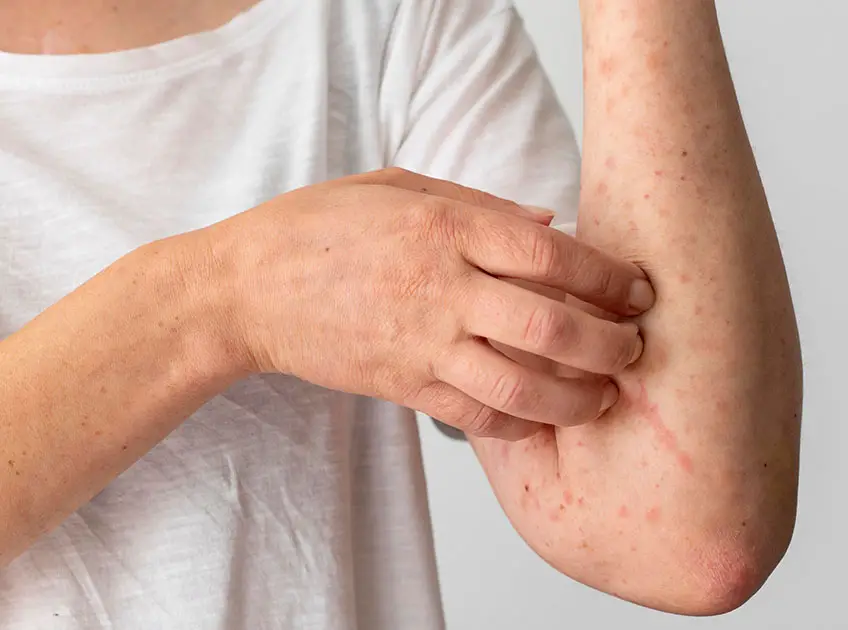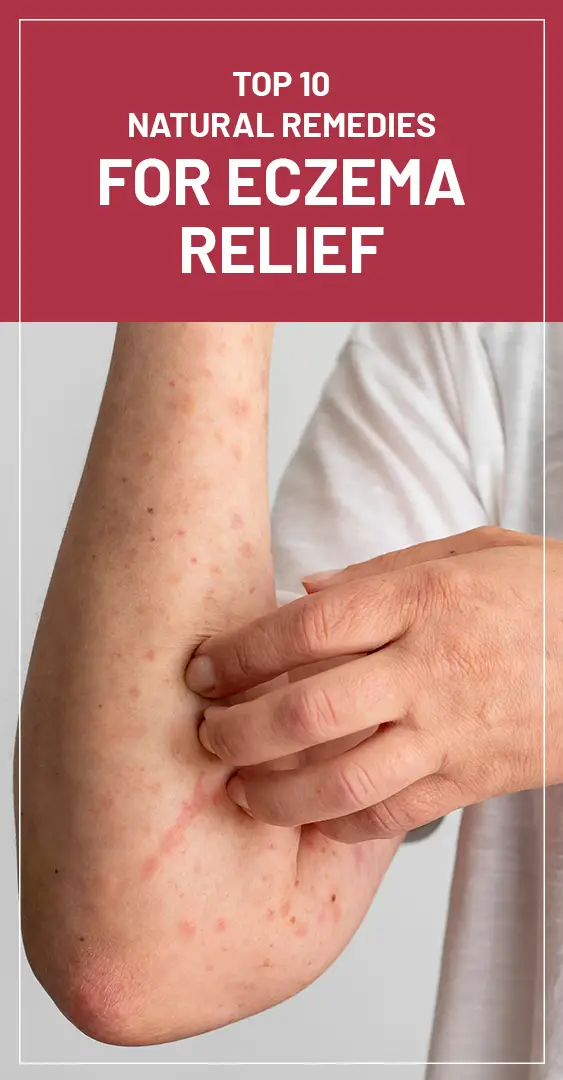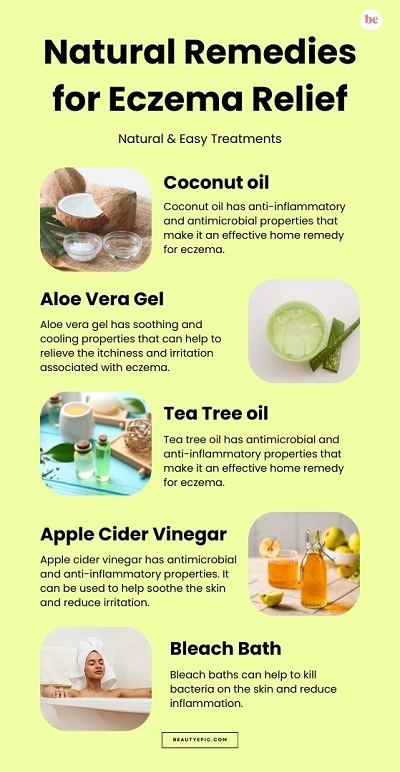
Important: This article is for informational purposes only. Please read our full disclaimer for more details.
Eczema is a general term for a group of inflammatory skin conditions that cause the skin to become itchy, red, and irritated. Atopic dermatitis, contact dermatitis, and seborrheic dermatitis are all types of eczema. While there is no cure for eczema, there are many ways to manage the symptoms and keep the condition under control. Home remedies can be a valuable addition to your eczema management plan.
10 Natural Remedies for Eczema Relief
1. Coconut Oil
- How it helps: Coconut oil has anti-inflammatory and antimicrobial properties that make it an effective home remedy for eczema. It can help to soothe and moisturize the skin. Locks in moisture, reduces dryness, and fights bacteria that may worsen eczema (1).
- How to use
- Warm a teaspoon of virgin coconut oil in your palms.
- Gently massage onto damp skin after bathing.
- Reapply 2–3 times a day to dry patches.
- Precaution: Avoid refined coconut oil—always use organic, cold-pressed. Some people may develop mild allergies; patch test first.
2. Aloe Vera Gel
- How it helps: Aloe vera gel has soothing and cooling properties that can help to relieve the itchiness and irritation associated with eczema. It also has anti-inflammatory and antimicrobial properties. Soothes irritation, hydrates skin, and promotes healing (2).
- How to use
- Slice a fresh aloe vera leaf and scoop out the clear gel.
- Apply directly to eczema patches.
- Leave for 20 minutes before rinsing or let it absorb overnight.
- Precaution: Avoid products with added alcohol or fragrances; these can irritate eczema-prone skin.
3. Colloidal Oatmeal Baths
- How it helps: Oatmeal has anti-inflammatory and soothing properties that make it a popular home remedy for eczema. Reduces itching, calms inflammation, and strengthens the skin barrier (3).
- How to use
- Grind plain oats into a fine powder.
- Add 1 cup of this powder to lukewarm bathwater.
- Soak for 10–15 minutes.
- Pat skin dry and apply moisturizer immediately.
- Precaution: Ensure water is lukewarm, not hot, as hot water can worsen eczema dryness.
4. Evening Primrose Oil
- How it helps: Provides gamma-linolenic acid (GLA), which reduces inflammation and itching (4).
- How to use:
- Topical: Apply a few drops of evening primrose oil to affected areas and massage gently.
- Oral supplement: Take capsules (consult a doctor for dosage).
- Precaution: Oral supplements may interact with certain medications (like blood thinners). Always consult your doctor first.
5. Honey
- How it helps: Honey has antimicrobial and anti-inflammatory properties. It can be used to help soothe the skin and reduce irritation. Natural antibacterial and healing properties, keep skin hydrated (5).
- How to use:
- Apply a thin layer of raw honey directly to eczema patches.
- Cover with a clean bandage if sticky.
- Leave on for 20–30 minutes, then rinse with lukewarm water.
- Precaution: Use raw, organic honey. Avoid if allergic to bee products.
6. Tea Tree Oil (Diluted)
- How it helps: Tea tree oil has antimicrobial and anti-inflammatory properties that make it an effective home remedy for eczema. It can help to soothe the skin and reduce irritation. Antimicrobial, reduces inflammation, and helps relieve itching (6).
- How to use:
- Mix 2–3 drops of tea tree oil with 1 tablespoon of carrier oil (like coconut or olive oil).
- Apply gently to affected skin once daily.
- Precaution: Never apply undiluted tea tree oil—it can cause burning or irritation. Patch test before use.
7. Apple Cider Vinegar (Diluted Solution)
- How it helps: Apple cider vinegar has antimicrobial and anti-inflammatory properties. It can be used to help soothe the skin and reduce irritation. Restores the skin’s natural acidity, reducing irritation and preventing infection (7).
- How to use:
- Mix 1 part apple cider vinegar with 2–3 parts water.
- Dip a cotton ball or clean cloth into the solution.
- Apply gently to eczema patches for 5–10 minutes, then rinse.
- Precaution: Avoid using on cracked or bleeding skin—it can sting badly. Always dilute.
8. Shea Butter
- How it helps: Deeply moisturizes, nourishes with vitamin E and fatty acids, and repairs the damaged skin barrier (8).
- How to use:
- Scoop a small amount of unrefined shea butter.
- Warm between palms and massage onto affected areas.
- Use after showers to lock in hydration.
- Precaution: Choose 100% raw shea butter. Avoid blends with synthetic fragrances.
9. Chamomile Compress
- How it helps: Anti-inflammatory flavonoids reduce redness, swelling, and itching (9).
- How to use:
- Brew a strong chamomile tea using 2–3 bags.
- Let it cool slightly.
- Dip a clean cloth into the tea and apply it to the affected skin for 10–15 minutes.
- Precaution: Some people allergic to ragweed may also react to chamomile. Patch test first.
10. Probiotics
- How it helps: Balances gut bacteria, which play a role in reducing immune-related skin flare-ups (10).
- How to use:
- Eat probiotic-rich foods: yogurt, kefir, sauerkraut, kimchi, kombucha.
- Consider a daily probiotic supplement (consult your doctor for the right strain and dose).
- Precaution: People with weakened immune systems should consult a doctor before taking supplements.
Tip: These remedies provide hydration, anti-inflammatory benefits, barrier protection, and immune support, all of which are essential for long-term eczema management.
7-Day Natural Eczema Care Routine
Day 1 – Hydration Boost
- Morning: Start your day with a glass of warm water + 1 tsp raw honey (soothes from the inside).
- Skincare: Apply coconut oil after a lukewarm shower.
- Diet focus: Eat probiotic-rich foods like yogurt or kefir.
- Relaxation: 10 minutes of deep breathing before bed to lower stress.
Day 2 – Soothing Aloe & Oats
- Morning: Aloe vera gel directly on eczema patches.
- Afternoon: Colloidal oatmeal bath (10–15 min soak).
- Diet focus: Add omega-3 foods like salmon or chia seeds to meals.
- Relaxation: Gentle yoga stretches (15 minutes).
Day 3 – Anti-Inflammatory Power
- Morning: Massage diluted tea tree oil (in coconut oil) on small eczema patches.
- Afternoon: Drink chamomile tea, then use the cooled tea bag as a compress.
- Diet focus: Green leafy vegetables + turmeric (in golden milk or cooking).
- Relaxation: Journaling or mindfulness meditation (10 minutes).
Day 4 – Deep Moisture Therapy
- Morning: Apply shea butter to dry skin areas.
- Evening: Short lukewarm shower followed by coconut oil + shea butter layering.
- Diet focus: Eat nuts/seeds (walnuts, flaxseeds) for healthy fats.
- Relaxation: 20 minutes of calming music or guided meditation.
Day 5 – Gentle Detox & Balance
- Morning: Drink diluted apple cider vinegar tonic (1 tsp ACV in 1 glass of water).
- Skincare: Honey mask on eczema patches for 20 minutes.
- Diet focus: Probiotic-rich fermented foods (kimchi, sauerkraut).
- Relaxation: Evening nature walk or grounding barefoot outdoors.
Day 6 – Repair & Calm
- Morning: Apply aloe vera gel + coconut oil mix for hydration and healing.
- Afternoon: Chamomile compress to calm any flare-ups.
- Diet focus: Anti-inflammatory meal with turmeric, ginger, and leafy greens.
- Relaxation: Aromatherapy with lavender essential oil before bed.
Day 7 – Strengthening the Barrier
- Morning: Oatmeal bath to reduce itching and lock in moisture.
- Evening: Massage evening primrose oil on eczema patches.
- Diet focus: A balanced meal plan rich in whole foods, avoiding triggers (sugar, processed foods).
- Relaxation: Gratitude journaling + deep breathing before sleep.
Extra Tips for the Week
- Always moisturize within 3 minutes of bathing to seal hydration.
- Wear cotton clothing and avoid harsh detergents.
- Track food triggers (dairy, gluten, processed foods) to see if they worsen symptoms.
- Stay consistent—eczema management is about routine, not quick fixes.
Stress and Eczema: The Mind-Skin Connection
Stress doesn’t cause eczema, but it can trigger or worsen flare-ups. Relaxation techniques such as deep breathing, yoga, and meditation have been shown to reduce skin inflammation by lowering stress hormones like cortisol.
Eat to Heal: Diet and Eczema Relief
Certain foods can either soothe or aggravate eczema. Omega-3-rich foods (salmon, flaxseeds, walnuts) reduce inflammation, while processed foods, dairy, and gluten may worsen symptoms in some individuals. A study published in Nutrients highlights the importance of an anti-inflammatory diet for skin health (11).
Smart Prevention: Keeping Flare-Ups at Bay
- Keep skin moisturized daily.
- Avoid harsh soaps and detergents.
- Choose cotton clothing over synthetics.
- Use a humidifier during dry weather.
- Identify and avoid personal triggers (fragrances, pollen, food sensitivities).
What to Avoid if You Have Eczema?
There are certain things that you should avoid if you have eczema. These include:
1. Harsh Soaps and Detergents: These can dry out the skin and trigger irritation. Look for mild, fragrance-free options.
2. Wool and Other Irritating Fabrics: These can irritate the skin and worsen eczema symptoms. Choose soft, breathable fabrics like cotton instead.
3. Hot Showers and Baths: These can dry out the skin and strip it of its natural oils. Take lukewarm showers or baths instead.
4. Allergens: Common allergens include dust mites, pet dander, pollen, and mold. If you are allergic to any of these, avoid exposure to them as much as possible.
5. Stress: Stress can worsen eczema symptoms. Practice stress-relieving techniques like yoga or meditation.
When to See a Doctor?
If home remedies and over-the-counter treatments are not providing relief, or if your eczema is getting worse, it is important to see a doctor. A doctor can diagnose the condition and develop a treatment plan that is right for you.
Eczema is a common skin condition that can be frustrating to deal with. However, there are many home remedies that can help to relieve the symptoms. If home remedies are not providing relief, it is important to see a doctor. A doctor can diagnose the condition and develop a treatment plan that is right for you.
Managing eczema requires patience, consistency, and a personalized approach. Natural remedies provide gentle, effective ways to soothe skin, strengthen the skin barrier, and reduce inflammation. By combining these with medical guidance and lifestyle changes, you can take meaningful steps toward healthier, calmer skin.
Frequently Asked Questions (FAQ’S)
1. Can natural remedies completely cure eczema?
A. No. Eczema is a chronic condition, but natural remedies can effectively control symptoms and reduce flare-ups.
2. Are these remedies safe for children?
A. Yes, most are safe, but always patch-test and consult a pediatrician before applying oils or herbal remedies to children.
3. Should I stop my prescribed medication if I use natural remedies?
A. No. Natural remedies work best as supportive care. Always continue prescribed treatments unless advised otherwise by your doctor.
You Might Also Like:
- Aloe Vera for Eczema: How to Use?
- Apple cider vinegar for eczema: How it works and uses?
- Coconut Oil for Eczema: How To Treat?
- Shea Butter for Eczema: How It Helps Soothe Itchy Skin
- How to Use Vaseline for Eczema?
- How to Use Epsom Salt for Eczema?
- emuaid EMUAIDMAX: Natural Skincare for All Ages
- 7 Best Face Washes For Eczema
- 7 Best Products For Lupus Skin
- 5 Ways Treat Eczema with Tea Tree Oil
- 30 Benefits and Uses of Epsom Salt

















